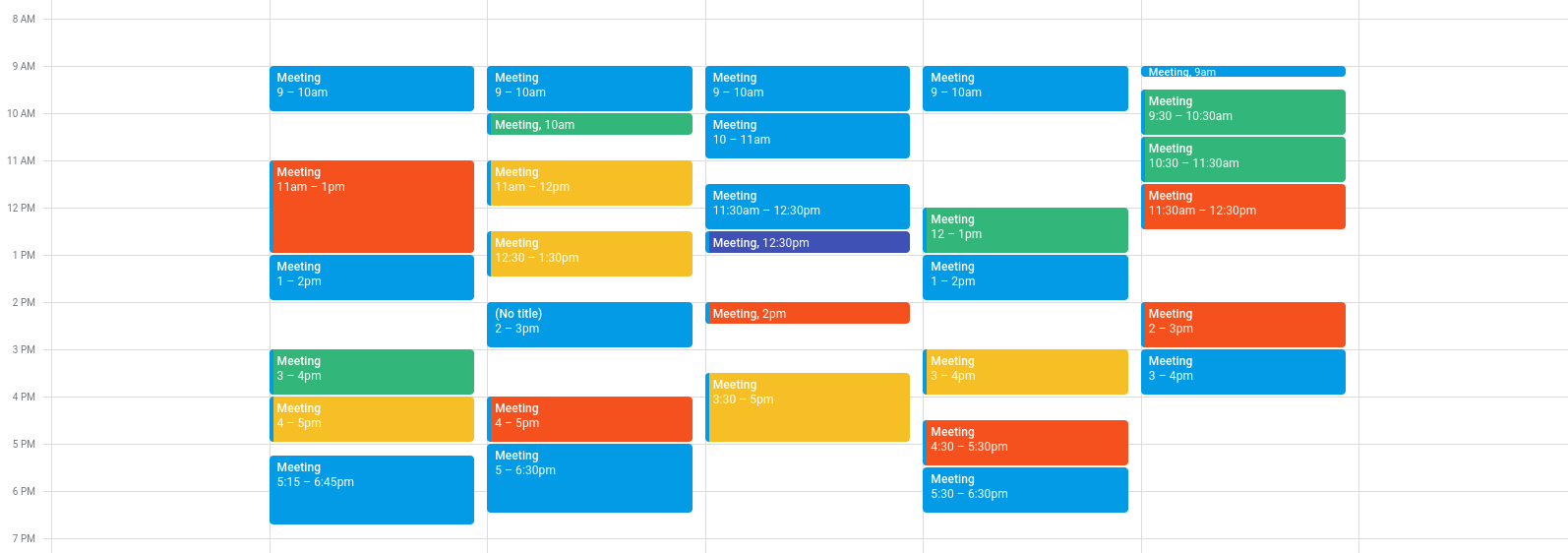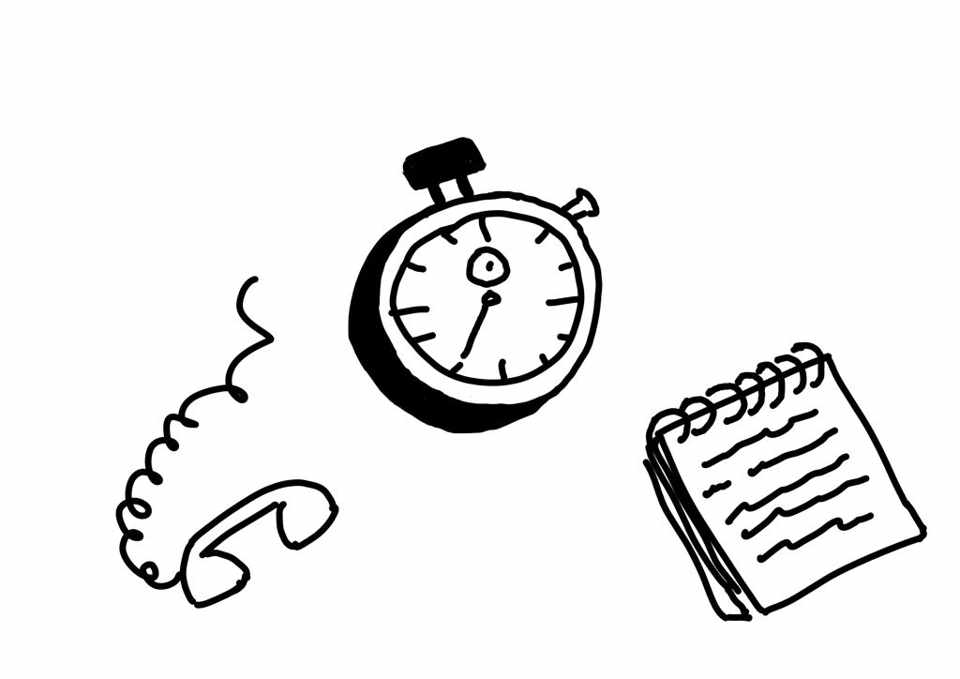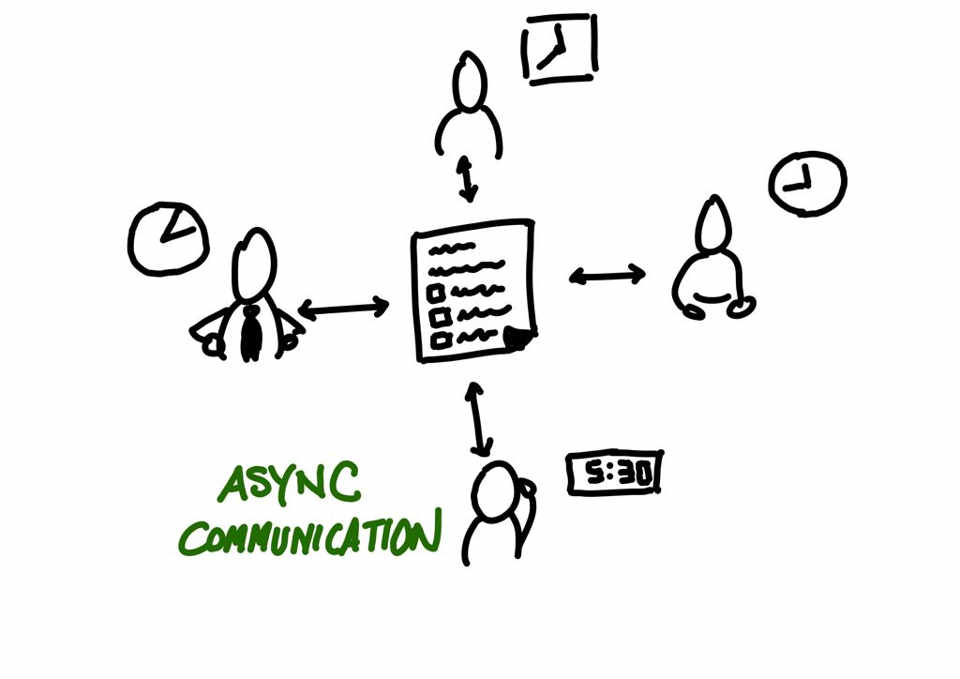Meeting Madness and The Five Stages of Meeting Grief

“Bloop bloop!
Bloop bloop! Bloop bloop!
-As a group we need to decide if […]
Bloop bloop!
-As a group we need to decide if we’re going to have two calls or three a day to guaranty maximum efficiency.”
The Conference Call - by David Grady
We’ve all been in very bad meetings at some point or another!
I think the worst meeting I have ever been part of in my career so far lasted two full working days and it had around 12 participants. The whole meeting lasted TWO DAYS! That is insane! Worst of all is, most of us were not even paying attention anymore after the first half an hour. A developer threatened to quit by the second day. And we still did not accomplish what we needed to.
How did that happen?
I was part of a team assigned to 2 different product managers, same platform but basically different products. The PMs had to share the team of developers. Most of the planning meetings were very long, sometimes they lasted 2 or 3 hours, and it consisted mostly of the PMs fighting for resources for their own product. It was a waste of everyone’s time. It was expensive. The meetings had no clear goal or structure. It was toxic. Now count all the other meetings! When do you even get any work done?! And that goes beyond a team setup like the one above.
I have also been in many conference calls that went exactly like in the video.
I have been in meetings that could have been emails. Meetings with no structure, no agenda, no goals. There were people attending that did not even need to be there. Interruptions due to audio delay. Unmuted microphones. Cringy ice breakers. No engagement nor follow ups. Overly long. Poorly prepared. Tangential topics. Zoom fatigue. They can be bad in many ways.
Why do we find ourselves in those situations?
I found myself in those meetings because I never questioned why that meeting is necessary or why am I needed there. I would just blindly accept the invitation, almost automatically, as if I have been building that muscle memory for a long time. And whenever I would speak up and try to suggest other ways of communicating I would be met with rejection. But everyone is still be complaining about meetings all the time. And just like in the video at the beginning of the article, we had meetings about meetings all the time.
And I was still the lucky one as a developer, some colleagues’ calendars looked more like this:

In which case they had to put in extra time to get some work done. Sure, some of those meetings were necessary, some were productive. But how can you manage not crashing after a day or week like that?
What is wrong with meetings?
Look, I am not saying meetings cannot be useful, they can be, but they should be used as the last resort. Communication is essential, you cannot not communicate in a work environment. Although depending on what is being communicated it might need different channels.
Just to be clear, I do not consider it a meeting when, for instance, two developers do pair programming on a task, a PM and a designer go through a design review, or some 1 on 1 meetings where feedback is given. There is actual work done, something productive comes out of it.
Attention span is getting shorter and shorter, having long meetings is not going to cut it. Anything longer than 50 or 60 minutes is too long. If longer, short breaks should be a must. But now, the meeting went over time. But wait, a few people have to jump on another call or run to another meeting, while the meeting keeps going. If you constantly have very long meeting, something is wrong. Why not use Estimation Points for meetings as well, like developers do for tasks. Anything longer has to be broken down, there is only that much information we can absorb in one sitting.

There is a difference between in person meetings and conference calls. Zoom fatigue is real, it takes a lot of energy, you cannot move much, you are distracted by your own insecurities, looking at yourself (you cannot see yourself in the in person meetings). There are so many interruptions due to audio delay. etc.
Meetings are also gatekeepers of information. How many times did you actually get meeting minutes or notes after a meeting was done? What about the people that are not working today? There is rarely information you can go back to if you need. How many times does “Let’s take it offline” just leads to another call? What happens when key decision makers are not available? Should the meeting even take place is someone who can provide answers is not there? How much information did you already forget by the time the meeting ended?
How many times do you think the meeting could have been much shorter if you would have or could have prepared before? But there was no agenda, so how can one prepare. There is context missing for the meeting. Or how many times did you wish you could go back to a transcript to confirm a few doubts that arise days or weeks after the meeting?
Those are a lot of questions to ask!
5 Stages of Grief
I’ve been through the five stages of grief during my career with meetings:
-
Denial: Thinking this next meeting will not be as bad as the previous ones, this next meeting will finally make sense.
-
Anger: There is a familiar feeling of frustration and anger as you realise that it is very hard to be part of a “good meeting”.
-
Bargaining: Trying to convince colleagues that there are other ways of making decisions or getting information out or even communicating.
-
Depression: Wondering if you’d ever escape that hellhole of endless and pointless meetings. What is the point of it all really?
-
Acceptance: Finally accepting it and resigning oneself to the fact that this is just how it is and learning to cope with it by day dreaming of the end of the meeting to return to actual work.
There is a different way
But it doesn’t have to end there, it doesn’t have to be like that, you don’t have to resign yourself to it. There is a sixth stage: Change.
There are things you can do about it. Do not just click “Accept” on every meeting invitation. Ask why you are needed there and what is the goal of the meeting. Can the meeting be replaced by an email or something else. Ask what is your role in that meeting.
And if you are organising a meeting ask yourself if it is really necessary. What are you trying to achieve. Do you need to steal all that time from all those people.
Discussions about many topics don’t have to happen in real time. Look no further than Open Source Software. Discussions can span over several days asynchronously, where someone can look up a piece of code and give a proper answer. Some people might be shy to speak up during a meeting, but it doesn’t mean they do not have anything to say. They might be able to write something down instead when they do not feel forced to engage in the moment and have all the attention on them. It’s important to remember to take into consideration people from vastly different timezones as well.
They are also not very accessible (sometimes bad audio, no real time captioning, no asssistive listening device availability). Information and decisions should be available to all, in equally effective ways, at the same time. Some people with disabilities might not speak up, and it’s not on them to request such things. Accessibility should be taken into account by default. If you’re not sure what’s needed, ask!

If you have 10 people locked in a room or in a conference call for 1 hour, that is 10 hours that you are losing and not just 1 hour. Now imagine you have an asynchronous meeting where you are writing down really well what you are trying to achieve, which might take you 30 minutes. Now someone can be prepared to give a proper answer, looking up some code and giving their opinion on it, might take 20 minutes. You go a bit back and forth, during a total of 40 minutes for example. Someone else sees the entire discussion and gives their opinion on it, maybe 10 minutes. A bit more back and forth, 1 hour in total, then a decision is reached. Things are clear to everyone, including people who might be out of the office or on vacation, etc. Information is all there, you can always go back, it’s also harder to play the “I remember you saying this in the meeting” game. And it took maybe let’s say 3 hours of everyone’s time including reading time, even if it’s more than that I assure it will be less than the total meeting time. Most importantly, you do not interrupt everyone’s work flow, given how hard it is for some to get back to it.
Best practices to keep in mind.
If you are organising a meeting, here are some things to consider:
- Only use a meeting as the last resort.
- You don’t need to have a meeting just to vote on something.
- You don’t need a meeting if you are giving away information, just write an email! Let people process it, they might have questions.
- Meetings can be asynchronous, make sure any discussion is transparent and in the right place, do not spread information for a topic over multiple channels, be strict about it.
- Asynchronous meetings also avoid trying wasting time finding the perfect time for everyone to be available.
- Always add a goal and an agenda in your invitation. Agenda items should include roles of the attending people (i.e. timekeeper, note taker, what they are there for).
- Agenda items should be framed as questions, this allows to reach a tangible conclusion.
- Time box the agenda items and be strict about it.
- Besides the goal, there should be some context to the meeting. Why are you trying to reach that goal. It will help attendees to be prepared.
- You can have NATO (No Action Talk Only) meetings, as long as it is clear to everyone.
- Consider having a Code of Conduct for meetings and sharing it with everyone, make sure everyone is aware of it and understands it.
- Leave a buffer at the end of the meeting and end it on time, some people might need to attend other meetings and they have some time to breath before. If you went over time something went wrong in the planning.
- If key decision makers are not available cancel or postpone the meeting.
- Make them **accessible **for everyone!
- If in person, it’s nice to bring something to share (i.e. Donuts, Pizza, Pastries), as you might be interrupting some people’s work flow and require them to pay full attention to you.
- Icebreakers are not fun or useful for everyone, take into account all the different personalities. Just get to the point. Introverts do not like being in the spotlight.
- Stay on topic and keep everyone on topic.
- Separation of concerns! Offtopics or tangencial topics should be stopped, then take a note of it and bring it up at another point. Urgent versus Important.
- Zoom fatigue is real, do not force people to have their camera on or to give you hours of their productive time.
- Share action items at the end of the meeting and assign people to them. Make sure everyone understands what they need to do after.
- Always leave time at the end and ask if there are any questions.
- Share the meeting minutes with everyone, keep some sort of document which you can constantly update.
- You can let people get out of the meeting earlier if it went faster. Give people their time back!
- Ask for honest feedback and constructive criticism after the meeting and keep it in mind for the next one. Try to make it anonymous, some people might be afraid to speak up or will not criticise “face to face” if they have to.
By practising this you might inspire others to follow. It’s okay to start small, maybe by having a “No Meetings Friday”, but be strict about it. Just try to reduce the overall amount of meetings in general.
If you are a meeting attendee or invited to attend a meeting:
- Question the need of the meeting!
- Ask for an agenda if there is not one in the invitation.
- Question why YOU are needed in the meeting.
- Come prepared to the meeting, and if you think something is incorrect or not taken into account after preparing for it, mention it before the meeting.
- If you think any of the timeboxed items might take longer, mention it before the meeting, give some time to the organiser to adjust.
- Consider joining via phone audio (for some people it is useful to pace around while talking).
- Consider turning off the camera to avoid looking at yourself during the meeting, fueling your insecurities or distracting you.
- Mute yourself when you are not talking.
- Do Not Disturb Mode. Turn off notifications from other applications.
- Take a long breath when someone is talking and there is a bit of silence, they might not be finished and you interrupt their thought process. Or make a note of your thought and bring it up later.
- It’s OK to say “I don’t know yet! I have to look into it before I commit to it”.
You don’t have to accept the status quo, you can fight for your right to focus on the work that matters.
Conclusion
If you get anything out of this I hope it’s useful to you and you can put some of these into practice.
- You don’t need meetings for everything!
- Not everyone has to be in every meeting!
- Meetings don’t have to happen in real time!
- If you have them in real time make them count!
- Meetings need preparation in advance!
- Time box and keep them short!
- Document them!
“Bloop bloop”, I’m out!
